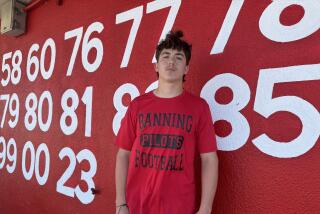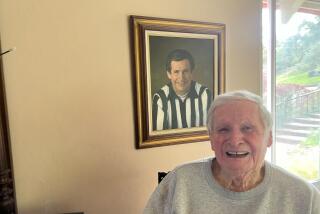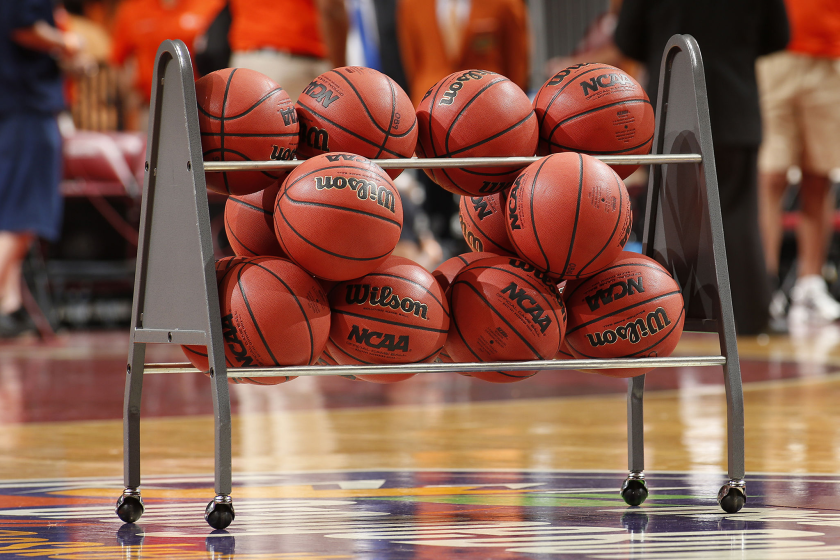Following the Bouncing Football, Fitzgerald Lands a Job in the NFL
- Share via
Jeff Fitzgerald never, not even for a moment, thought football was the most important thing in his life. At best, he figures, it ranked no higher than third on his list of priorities.
Breathing and maintaining a pulse, he says, were always just a notch more important.
Other than that, however, it was pretty much football, football, football.
When Fitzgerald was a linebacker at Burroughs High in Burbank, flames shot from his nose and smoke billowed from his ears. And that was just during team meetings. He felt that any teammate who didn’t give 100% of his effort--and much of his blood--to the game ought to take up other sports. Figure skating, for example, with a chance to wear those really cute sequined tights.
So, still clinging to that attitude, he was confronted after three seasons at Oregon State by a doctor who told him his right knee was history and that he never again would be able to play football.
You might guess his reaction.
“I was never a great athlete,” said Fitzgerald, 30, who graduated from Burroughs in 1978 after three standout seasons. “I never had the great size or speed or natural ability to play football.
“I knew very early in my career that in order to play I had to give my body up. I had gotten used to that idea in high school and college.
“The X’s and O’s never interested me very much. I had to play an aggressive, intimidation style. A physical game.
“So when the doctors told me what the damage to my knee was and that I’d never play again, my only thought was, ‘They don’t know. They don’t know me.’ If this was somebody else, maybe they’d be right. But this is me. I knew I’d play again.”
And he did. Sort of. He played in a few games for the Burbank Bandits of the High Desert League, a local sandlot-type organization in which players occasionally used black electrical tape on their ankles.
But the doctors were, for all intents, correct. With a shattered anterior cruciate ligament, Fitzgerald’s knee was gone and nothing could bring it back to the condition necessary for high-level football.
And so Fitzgerald was a spectator at age 21. But those who knew Fitzgerald well knew he would resurface in the game sometime. Someplace.
The time is now. The place is Tampa Bay.
Fitzgerald landed a job on the coaching staff of the NFL’s Buccaneers as an assistant to the defensive coordinator. It is a prime job for a young man with dreams of a long, long career in the game.
And, as with just about everything else in Fitzgerald’s football career, it did not come easily. The road he traveled from the doctor’s office in Oregon to the Florida city on the Gulf of Mexico took him through Burbank, Cincinnati and then Tuscaloosa, Ala.
But throughout the seven-year odyssey that finally deposited him in Tampa Bay, Fitzgerald says he always knew that he’d find his pot of gold. Or at least a coach’s whistle with his name on it.
“Things always worked out for me,” Fitzgerald said. “At each stop, something happened, a door opened, and I was off to a better place.”
His coaching career began at Burroughs, where his playing career had begun. He worked as a volunteer coach for two years, and those two years came at a crucial time. He had left Oregon State in 1981 after the injury and enrolled at Cal State Northridge, where he earned his B.A. degree in physical education.
“But I missed football so much,” he said. “When the opportunity came at Burroughs, I jumped at it. It was a way to have a full-time hand in football again, and I needed that. It allowed me to stay in the game.”
After two seasons he moved to Burbank High, where he hooked up with Coach Dave Carson, who had been an assistant at CSUN and, coincidentally, Fitzgerald’s academic adviser.
“We hit it off right away,” Fitzgerald said. “Dave Carson and I saw eye to eye on how football should be played. In my two years at Burbank High, I realized that coaching was for me, that I wanted to make a career of it.”
In 1984, Fitzgerald took a big step into the college game, taking an assistant coaching job at the University of Cincinnati, a school where Carson happened to know several members of the coaching staff.
“Dave opened the door for me,” Fitzgerald said. “Cincinnati called me and offered me a job on a Wednesday in 1984, and I packed everything I owned and was there that Friday and we started spring practice Saturday morning.”
At Cincinnati, Fitzgerald worked with the defensive linemen. He stayed for one year. But during that time, Cincinnati played a game against the University of Alabama in Tuscaloosa. Fitzgerald thought he had stumbled into heaven. He had found a city where the entire population believed, as he did, that football is much, much more than a game.
“I was in complete awe of the people and the school,” he said. “Football means everything to those people. It is life and death. And that’s just the way I feel. I decided on that trip that Alabama was the place for me.”
When he returned to Cincinnati, he began licking stamps at a feverish pace. All of the envelopes were addressed to members of the Alabama coaching staff. He made dozens and dozens of phone calls.
That was not enough. He left his job at Cincinnati and enrolled at Alabama, where he proceeded to earn his master’s degree in physical education.
But the degree was not, he freely admits, the reason for going.
“I knew if I was in school there I’d have a better shot at getting a job there,” he said.
Eventually, he got to know one of the assistant football coaches. And not long after that, he got to speak to the head coach, Ray Perkins. It was, he hints, goose-bump time.
“Coach Perkins invited me in for an interview,” Fitzgerald said, “and lo and behold, he hired me on the spot.”
It was 1986. Fitzgerald was 26. He was hired as a graduate assistant on the coaching staff, a low-level job that brought Fitzgerald a monthly stipend of about $350. It was, he said, the job he had long dreamed about.
“I had never been so excited in my life,” he said. “I only got to spend one year with Coach Perkins, but that was a great year. I had so much respect for him. He was always honest and straight-forward and treated everyone fairly. He is a straight-shooting guy.”
The bad news for Fitzgerald, however, was that in 1987 Perkins shot straight to Florida to take a new job. A few years later, though, this was to become very good news for Fitzgerald.
He stayed at Alabama for three seasons, the final one earning a position as a full-time football coach and a physical education instructor.
Then, in 1989, he heard that an assistant coaching job was about to open up on the staff on the Tampa Bay Buccaneers. And golly, if ol’ Ray Perkins didn’t just happen to be the head coach of the Bucs.
“I had talked with Coach Perkins in Tampa Bay many times after he left Alabama,” Fitzgerald said. “So when I heard there might be a job there, I called again. And he told me that he had already been considering me for the job. I rushed down there to talk with him and was hired the following day.”
Fitzgerald’s duties as a defensive assistant are largely in the film room, where he evaluates upcoming opponents and issues reports on their tendencies. Then, during practice, he helps organize a mock opponent team to run against Tampa Bay’s offense and defense.
All of which makes Fitzgerald, a football guy right through to the bones, a very happy guy.
“I’ve been around coaching now for about 10 years,” he said, “which is long enough to know that it’s a tough business and that next year I might be out of it completely. There are a lot of very good coaches around who are not working.
“But I will be here every day for this team, pushing and pushing day after day, busting my butt and taking everything a little bit further than they expect me to,” he said. “I work more than 14 hours a day, seven days a week at it. And if I keep doing that, I believe I will succeed in this business.
“And you know what, after all these years I’m just as crazy about football as I’ve always been. But I keep thinking, ‘If I could just run down that field for one kickoff . . .’
“So I tell the players to remember these days, to remember them and enjoy them. Because if you get to play football, you are a very lucky person.
“I’ve been given a chance to coach football, and I think that’s almost as lucky. Because football, well, football is the greatest thing there is.”
More to Read
Go beyond the scoreboard
Get the latest on L.A.'s teams in the daily Sports Report newsletter.
You may occasionally receive promotional content from the Los Angeles Times.










